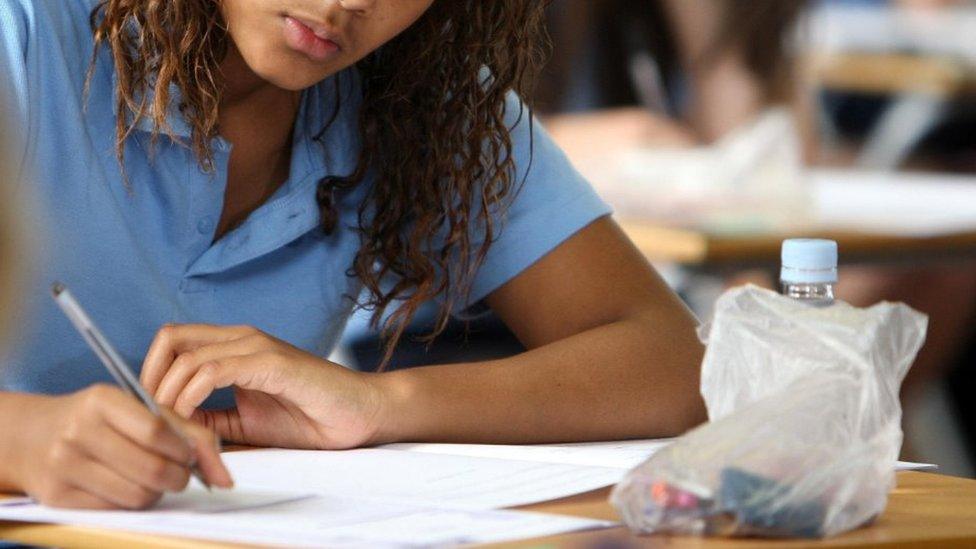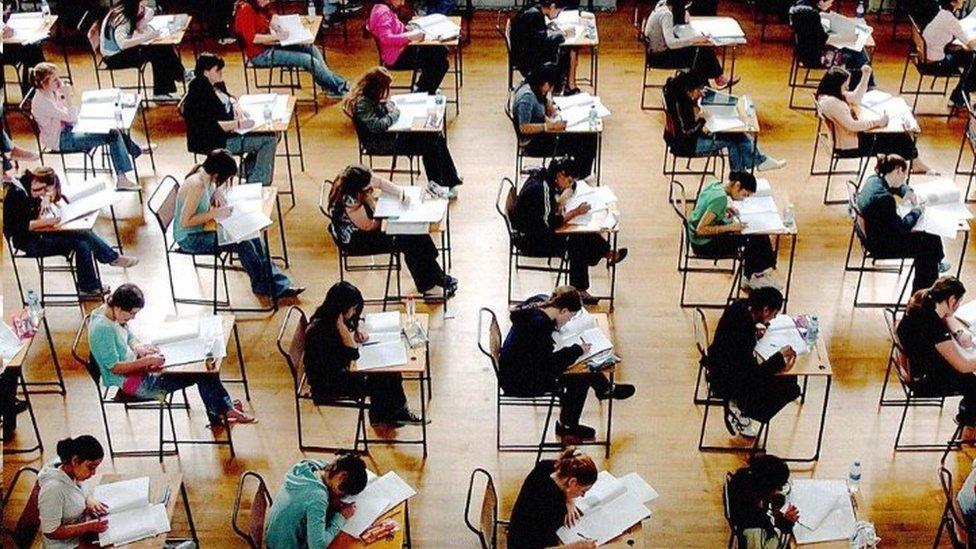GCSE choices will narrow next year, says academy chain
- Published
- comments

One of the largest academy trusts in England will encourage some pupils to sit fewer GCSEs next year.
The Harris Federation runs almost 30 secondary schools across London.
The federation's move comes amid a debate about whether it is possible to maintain a broad range of subjects after so much school has been missed.
However, another academy chain, United Learning, said it would prefer as many pupils as possible to keep up "a breadth of GCSEs".
An official consultation on how schools and exam boards should run next year's GCSE and A-levels in England is expected to be launched soon.
Usually secondary schools are expected to offer a wide range of subjects up to GCSE.
But teenagers have missed a lot of classroom teaching in recent months during the coronavirus pandemic, leaving some schools concerned about the pressure a broad curriculum might generate ahead of next year's exams.
Lockdown learning loss?
Harris Federation's director of education, Carolyn English, said they were looking at how they could help GCSE pupils after months of disrupted education.
"We are thinking: what could we do to to narrow the curriculum, particularly with year 11 who have missed two terms, so nearly half of their courses, and are going to come back in September with only two terms to go until their examinations?"
Usually pupils would be expected to take eight or nine GCSEs, but Ms English told the BBC that even for pupils who had engaged with online learning, it might be too much.
"We would suggest that they should maybe be looking at taking six, or even five, or whatever suits the child best in order to make sure they're ready to do their A-Levels and consequently ready to go to university or do the careers they want to do.
"That would mean they could cover the content in those subjects in the depth they need, rather than spreading the content across eight subjects that they might be giving up in a few months time."
She stressed this would not mean, for example, sacrificing creative subjects for a set of academic core subjects, but rather looking at what each pupil needed in order to get to the next stage.
Jon Coles, chief executive of United Learning which runs schools in many areas of deprivation struck a more cautious note.
"Ideally, we'd want everyone to carry on doing all their subjects but some students will have fallen well behind.
"If schools think a young person who is currently doing nine, 10 or more GCSEs would do much better by dropping one to concentrate on the rest, then they will want talk to the student and their parents about that.
"Obviously, this is something that happens in any year with a few students. It may be a bit more frequent this year, but I'm sure schools will want to keep it to a minimum.
"I've got no doubt that schools will all be trying to do their best for each young person to make sure that they keep a breadth of GCSEs while getting the best grades they can."
A leaked early draft of the government's consultation on how schools will run in September suggests a more flexible approach to the numbers of subjects teenagers study is under consideration.
A lot will depend on how GCSEs in particular are examined next summer.

Exams regulator Ofqual is expected to start a short consultation soon on the options, which may include delaying the exams.
Some head teachers would like to see more optional questions, so pupils could answer on the topics they have been able to cover.
Natalie Perera from the Education Policy Institute says schools will need flexibility to decide what's best for their pupils.
"What we've seen during lockdown is children from poorer families have less access to technology, and might not have online teacher led lessons.
"So their schools might need to rethink how they approach exams next year."
She said a temporary a change to how schools were inspected might be needed next year, as a broad and balanced range of subjects is a key measure used by Ofsted.
A Department for Education spokesman said: "We are working to ensure all children can return to school in September and will publish guidance for schools soon. It is important that all children enjoy a broad and balanced curriculum."